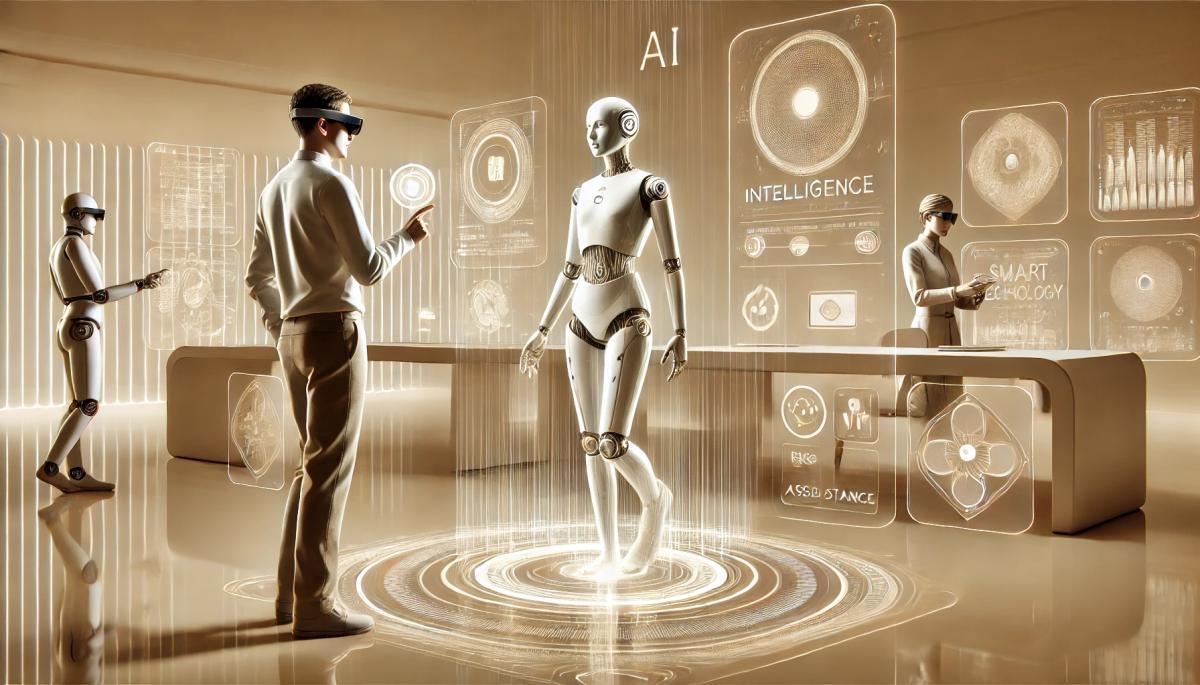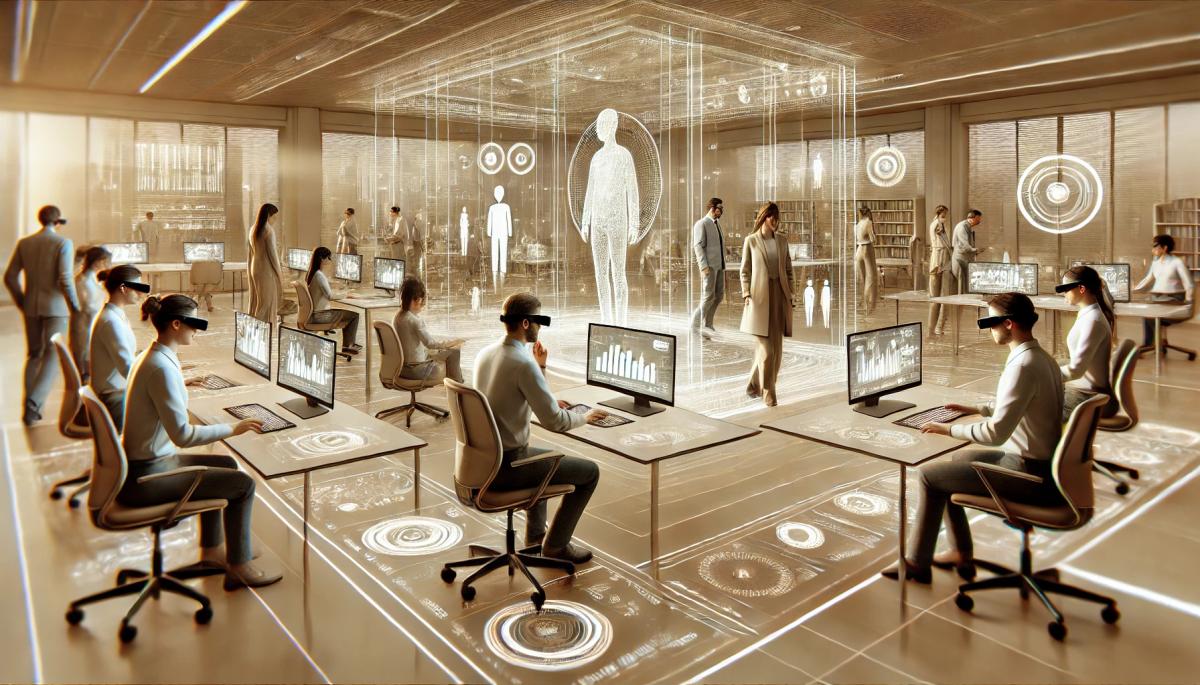the online world in 2050: what awaits us in the digital future?
Do you want to know what awaits us in 2050? Forget flying cars, the real revolution will happen online. Artificial intelligence will advise us on what to wear, smart homes will take care of shopping, and in virtual reality, we will have coffee with a friend from across the world.

We live in an era of technological revolution, which continuously brings new discoveries. That is why some predict that our world will look like a true sci-fi movie in a few years. But is this really the case? Join us as we explore where, according to some experts and scientists, we might be heading by 2050.
Ubiquitous artificial intelligence
Our daily lives will likely depend on artificial intelligence. Instead of single-use applications or smart assistants as we know them today, AI will become a universal guide, recognizing our moods, needs, and even predicting our desires.
Thanks to advanced machine learning, artificial intelligence will be able to provide tailored advice in areas such as education, healthcare, and personal finance. However, it will also bring many ethical questions, including how to ensure it respects users' privacy and does not jeopardize their safety.
This will also lead to an increase in legal disputes, prompting governments worldwide to introduce new legislation and regulations.
The internet of things on an entirely new level
The Internet of Things (IoT), or the interconnection of physical devices and systems via the internet, will experience tremendous growth by 2050. Imagine cities where everything from transportation systems to home appliances is connected and automated.
Smart homes will become the standard, with your house responding to your wishes and needs without you having to do anything. Your refrigerator will automatically order groceries, lighting will adjust to your mood, and your mirror will offer lifestyle recommendations based on your health analysis.

Virtual and augmented reality
With the further development of virtual (VR) and augmented reality (AR), the line between the digital and real world will blur even more. People will be able to enter entirely different realities through VR and AR or enrich their everyday reality with digital elements.
Work, education, and social interactions will move into the virtual space, where people will meet, have fun, and collaborate regardless of distance. We might be heading towards a time when even personal doctor visits or business meetings take place in the digital realm, using realistic avatars in environments that perfectly mimic the real world.
Blockchain and data security
Blockchain technology has the potential to significantly affect the security and transparency of the online world. It is expected that by 2050, blockchain systems will be the foundation of all digital transactions, contracts, and identities.
This technology will enable more secure and transparent data processing, which could reduce cyber threats and fraud. The future of blockchain might also include decentralized social networks and applications, where each user controls their data without relying on central servers.
Digital economy and the future of work
Work in 2050 will look completely different from today. With the rapid rise of automation and AI, many current professions will become a thing of the past. However, the digital economy will offer new opportunities and job roles that we don't even know about today.
Traditional office environments will be replaced by virtual offices, where people work through VR headsets. Flexibility of work and new forms of digital skills will become crucial aspects.
The form of education will also change, being more focused on technology, data, and creativity. Instead of traditional studies, there will be a growing demand for online courses, allowing people to change jobs within months without studying for years.

Advanced personalization and digital identity
Digital identity and personalization will reach new levels. Thanks to advanced data analysis and machine learning, applications and services will be tailored to the specific needs and preferences of users.
By 2050, every user will have a unique digital "signature" that will accompany them across all digital services, from social networks to banking services. However, digital identity will also raise questions about privacy and security, leading to a higher demand for technologies that protect privacy.
Interactive entertainment and games
Online entertainment and the gaming industry will undergo significant transformation. Games in 2050 will offer realistic virtual worlds that respond to every player’s movement and gesture. Virtual concerts, festivals, and interactive shows will bring entertainment directly to viewers in the form of a fully immersive digital experience.
With advancements in VR and AR, it will be possible to literally step into the story of movies and series, becoming the main character and influencing the plot. Entertainment in 2050 will be a completely different experience than we know today.
The online world in 2050 promises amazing possibilities and innovations that will change our daily lives. From artificial intelligence to virtual reality, technologies will connect people across continents, provide personalized services, and offer new forms of entertainment. However, the future will also bring many challenges, especially in the area of security and ethics.
Wireless charging: What are its benefits, limitations, and where is it heading?

Wireless charging has evolved from a luxury feature to a standard part of most modern phones. Simply place your mobile on the pad, and energy begins to flow without searching for a cable and connector. We explain how wireless charging works, what it entails, and why Qi and Qi2 technologies have become the new standard of convenience.
What is Wi-Fi 7? What changes does it bring and when does it make sense to switch

Today's home Wi-Fi network is under increasing pressure. It has to handle video calls, online gaming, and dozens of smart devices. The new Wi-Fi 7 standard offers a solution that takes wireless connectivity to the next level. We'll explain what this standard means in practice and why it might be crucial for the future of home and business networks.
What is DNS? Everything you need to know about its functionality and setup

When you type a website address into the browser, the correct page loads in an instant. This is managed by the DNS system, without which the internet as we know it would not exist at all. In this article, you will learn what DNS is, how it works, what types of records it contains, and why it is important for both speed and security of the connection.
How does fiber optic internet work and what do you need for its installation?

Fast and stable connection is a basic necessity in every household today. The solution is fiber optic internet, which works differently than regular cables and offers greater reliability to users. We'll explain how this technology works in practice, what it entails to run a fiber optic cable to your home, and what equipment you’ll need to keep everything running smoothly.
Cloud gaming – the end of consoles in sight?

Cloud gaming allows you to play games from anywhere without the need for expensive hardware. In this article, you'll learn how game streaming works, what advantages and limitations it brings, and which services are leading the way today. And most importantly: can it really threaten traditional consoles?
Chips under the skin and in the head. The future is closer than we think

Brain microchips already allow controlling a computer with mere thoughts. In the article, you will learn how they work, what they have brought to the first users, and what promises scientists and Elon Musk associate with them. Along with hopes, questions about safety, ethics, and where this technology might take us also arise.